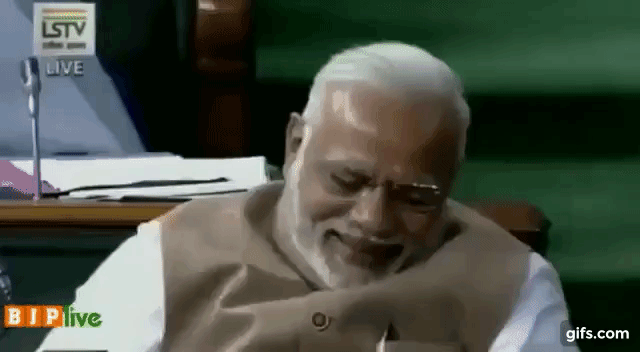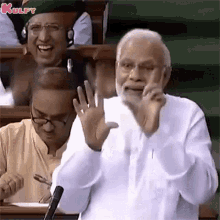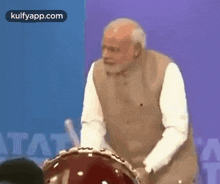- Joined
- Jul 18, 2014
- Messages
- 4,677
- Points
- 113
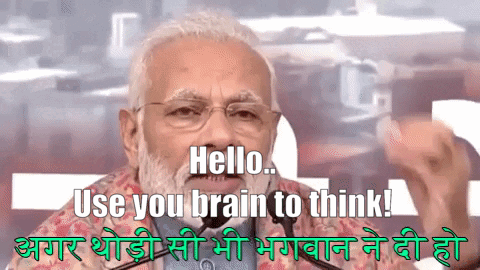
https://www.channelnewsasia.com/asi...ction-bjp-fragile-opposition-alliance-4277886
India’s PM Modi is likely to win a rare third term in office, but by how big a margin?
Speculation has focused not on whether Mr Modi and his Bharatiya Janata Party (BJP) will win, but on the scale of the victory against a fragmented opposition alliance.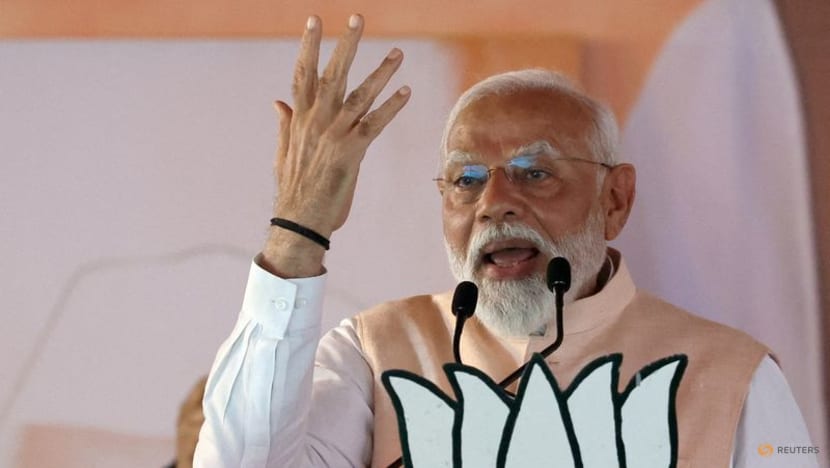
FILE PHOTO: India's Prime Minister Narendra Modi speaks during an election campaign rally in Meerut, India, March 31, 2024. REUTERS/Anushree Fadnavis/File Photo
India began voting on Friday (Apr 19) in the world's largest election, as the country’s Prime Minister Narendra Modi seeks to secure a rare third term in power.
Speculation has focused not on whether Mr Modi and his Bharatiya Janata Party (BJP) will win, but on the scale of the victory against a fragmented opposition alliance.
HOW DOES THE ELECTION WORK?
The mammoth democratic exercise involves a total of seven phases spread over six weeks, to ease the logistical burden of holding the polls in the world's most populous country.Nearly a billion people are eligible to vote, which is more than the combined population of all European countries as well as the total population of all nations in Southeast Asia.
Turnout during the last general elections was more than 67 per cent.
More than a million polling stations will be set up, housing around 5.5 million electronic voting machines to allow for faster counting of ballots.
To ensure the process is smooth, around 15 million officials and security staff will be on duty.
Voters will be electing 543 lawmakers for the lower house of India's parliament for a five-year term, while the president will nominate two more lawmakers.
A party needs a simple majority of 273 seats to form the next government with its choice of prime minister. But if no single party reaches that mark, the president will ask the single-largest party to attempt to put together a coalition.
Voting will conclude with the final phase on Jun 1, and counting for all phases will be done on Jun 4.
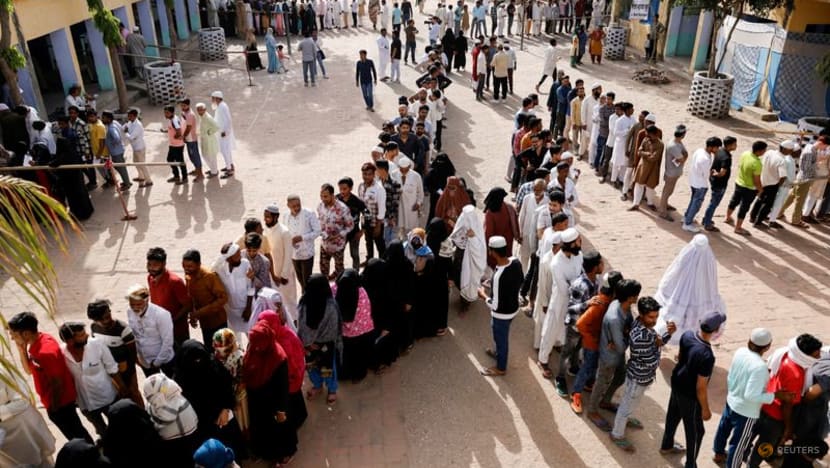
Voters line up outside a polling station to vote during the first phase of the general election in Kairana, in the northern Indian state of Uttar Pradesh, India, April 19, 2024. REUTERS/Anushree Fadnavis
HOW MANY SEATS DOES MODI WANT?
The BJP’s position is seen as unrivalled as a result of Mr Modi’s cult-like status.The 73-year-old leader remains popular in the country even after a decade in office, according to opinion polls, and is widely expected to return to power.
During Mr Modi’s premiership, India has evolved on the global stage to become a force to be reckoned with by other world powers. Domestically, his Hindu nationalist agenda has helped him win support across class barriers.
He is also seen as a man of the people, often reminding voters at rallies that he rose from the depths of poverty to serve the nation.
“Millions of Indians relate to his personal story. He rose to high office from humble origins, that's something many, many Indians aspire to, and which sets him apart from the leaders of the opposition,” said Dr Karthik Nachiappan, research fellow at the National University of Singapore’s Institute of South Asian Studies.
“He's a masterful politician and storyteller. He is able to connect directly with the Indian public, through social media, where he shows a genuine desire to understand and address the problems of the common man. He is also seen as a leader who gets things done and who deeply resonates with the Indian public.”
If Mr Modi wins this election, he will become only the second leader after India's first prime minister Jawaharlal Nehru to secure three back-to-back terms.
His BJP party has pledged to boost social welfare programmes, create jobs and boost investment.
Mr Modi has expressed confidence in securing more than 400 seats for the BJP-led group of parties, the National Democratic Alliance. He expects BJP alone to win 370 seats.
In the last election in 2019, the BJP swept 303 parliamentary seats out of 543. Together with its coalition partners, they took 352 seats.
“Normally, when you've been in power for 10 years, there would be an anti-incumbency factor and you will find it a bit more challenging to try and win a third term,” said Dr Pradeep Taneja, senior lecturer in Asian politics, political economy and international relations at the University of Melbourne.
“But I think this time, Prime Minister Modi and the BJP feel pretty confident that they're going to win this election. They actually claim that they're going to get 370 seats for the BJP and 400 for the coalition. So clearly, they have much greater ambition than they did last time.”
WHY IS MODI FIGHTING TO WIN OVER THE SOUTH?
Mr Modi’s BJP has significantly intensified its focus on the southern states, where it has a weaker presence.“BJP is much more popular in north India and western India, but not so popular in southern India,” Dr Taneja told CNA’s Asia First on Friday.
“In the state of Tamil Nadu, which goes to the polls today, BJP has been struggling to make headway.”
He said politics in the southern parts of India are different, adding that the states there are more developed.
“They have a higher level of infrastructure, life expectancy, basic education and health, and therefore their expectations are focused on a much more harmonious and comprehensive development,” he said.
In the south, the issues of social justice have been very strong, said Dr Nachiappan.
Mr Modi is now spending a considerable amount of time campaigning in those parts to increase his vote share and his party's seats.
“It remains to be seen if they can win more seats there,” Dr Nachiappan told CNA938 on Friday.
“But Modi's track record, his personality, and his ability to get things done are now becoming very competitive aspects through which the BJP can also run in the south. Because some of the issues that the people in the south now care about are the same as in the north - development, progress and ensuring that India rises faster than it ever has.”
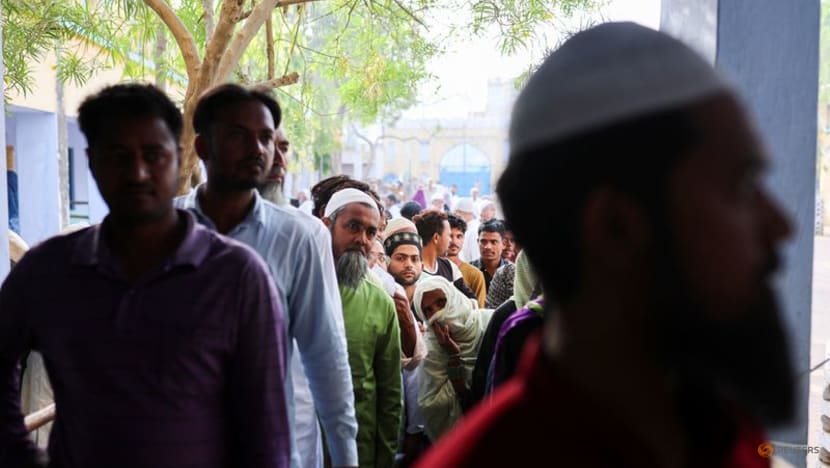
Voters wait outside a polling station to vote during the first phase of the general election in Kairana, in the northern Indian state of Uttar Pradesh, India, April 19, 2024. REUTERS/Anushree Fadnavis
CAN ANYONE BEAT MODI AND BJP?
The main opposition political group, the Congress Party, won 52 seats in 2019, up just slightly from the 44 in 2014 when they were voted out of office after governing India for decades.It has formed an alliance with other opposition parties - the Indian National Developmental Inclusive Alliance - for a real shot at toppling the BJP.
Dr Nachiappan said the opposition remains resilient in some states, especially in southern and eastern India, where the BJP is in a competitive fight for most seats.
The opposition has vowed to boost social spending and reverse what it views as India’s slide into autocracy.
But the bloc of more than 25 parties seems to be in crisis, as it faces defections, infighting and a crackdown by India's law enforcement agencies.
These parties have claimed that the Modi government is targeting only opposition politicians in its crackdown on alleged corruption, a charge that the BJP denied.
A spate of recent defections to the BJP is also a problem for the opposition.
Out of the candidates listed by the BJP so far for the upcoming elections, 28 per cent are defectors, and most of them were with the Congress before joining the ruling party.
Former Union minister Milind Deora, for instance, announced in January he was quitting the Congress Party and defected to the faction of a regional party in Mumbai – the Shiv Sena, backed by the BJP.
He criticised Congress’s leadership for being inaccessible and not allowing talented youngsters to participate in decision-making processes.
“When anyone in any organisation, whether you are in a political or a private organisation, if your merit is not rewarded, your capability and capacity is used against you, and mediocrity is encouraged, it is natural that people will move on,” he said.
Observers said the opposition coalition is fragile. For months, the alliance struggled to put up a united front and iron out differences over seat sharing.
“Opposition parties have failed on two counts,” said political analyst Nilanjan Mukhopadhyay.
“One is to stitch an all-India opposition which actually unites parties, where in every state, there is one opposition candidate against the BJP candidate. That has not worked. The second thing is in terms of an idea. What is the alternative to Mr Modi’s India that you are going to present? That has not been communicated to the people of India.”
There is also no clear prime ministerial candidate for the opposition, said Dr Nachiappan.
“So that's a weakness, and that's a weakness that the BJP is now exploiting in its own campaign.”
While Indian National Congress leader Rahul Gandhi - whose father, grandmother and great-grandfather were all prime ministers - remains the most recognisable face of the opposition bloc, there are disagreements on whether he should be the one to front the alliance.
WHY DOES THE ELECTION OUTCOME MATTER?
Mr Modi's critics believe another five years in office could put India's democratic credentials further at risk, and make his rule even more authoritarian.There are fears that dominance by the BJP could lead to unchecked power and authoritarian tendencies in India, which is among the fastest growing major economies in the world.
The elections are taking place amid growing geopolitical tensions among major powers, and India’s role on the international stage has become increasingly important.
“Modi and the BJP want the voters to know and recognise India's growing importance in the world. What Modi and the BJP have done over the past decade is make Indians care about India's place, its rising status and its growing power,” said Dr Nachiappan.
“So there's much more of a premium on showing and demonstrating how India works with other major countries, (and) how India works with coalitions and like-minded partners like the United States, Australia and Japan to really advance their mutual interests in Asia and globally.”
-------------

